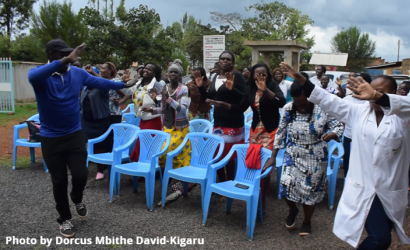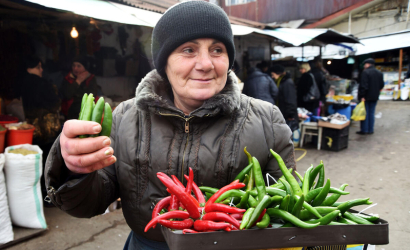While there are many ways to promote sustainable healthy diets, school-based approaches are uniquely positioned to catalyse positive change thanks to their power to shape lifelong eating habits, core food skills and preferences for locally available nutritious food. This enables them to combat multiple forms of malnutrition alongside other development challenges, such as environmental conservation, climate change mitigation, poverty reduction and access to education. Recognizing both the need and potential, the Food and Agriculture Organization of the United Nations (FAO) and the United Nations Children’s Fund (UNICEF) established a new partnership that focuses on strengthening capacities for nutrition education in schools to improve diets of schoolchildren, leveraging their respective comparative advantages.
The partnership is specific to the education niche of school nutrition and is just one of the spinoffs of a discussion paper on Schools as a system to improve nutrition [1], which triggered increased collaboration among stakeholders. It also complements the joint work pursued by the Rome-based agencies (FAO, the International Fund for Agricultural Development [IFAD] and the World Food Programme [WFP]) on other facets of school nutrition, such as Home-grown School Feeding.
A perfect marriage
FAO brings unparalleled technical expertise in nutrition education from the food angle, while UNICEF has extensive experience in supporting school health programmes with nutrition components in over 80 countries around the world. For decades, FAO has supported countries with integrating nutrition education into primary and secondary curricula, developing learning and training materials and setting pedagogical school gardens. Its current efforts focus on the capacity development of government and instituting a new support package, jointly developed with UNICEF, to enhance the scope, behavioural impact and reach of school-based food and nutrition education (SFNE) in low- and middle-income countries (LMICs). Melissa Vargas, Cristina Álvarez and Yenory Hernández, core members of the SFNE team at FAO, expressed excitement about how the partnership is opening doors to roll out and improve the package, comprised of a capacity needs assessment tool and a range of workshop materials from facilitation guides to presentations and participant workbooks.
UNICEF recognizes the importance of schools as an effective platform to deliver evidence-based interventions that safeguard the health and well-being of school-age children. It advocates for and supports policies, strategies and programmes that strengthen knowledge and skills to promote healthy diets for children and other good nutrition practices (e.g. handwashing at key moments) as part of its wider portfolio of work. In addition, UNICEF has become increasingly active in adolescent nutrition in recent years, cognizant of related physiological and social vulnerabilities, scientifically demonstrated opportunities for catch-up growth during this phase of the lifecycle and the influence youth can have as change agents within their families and communities.
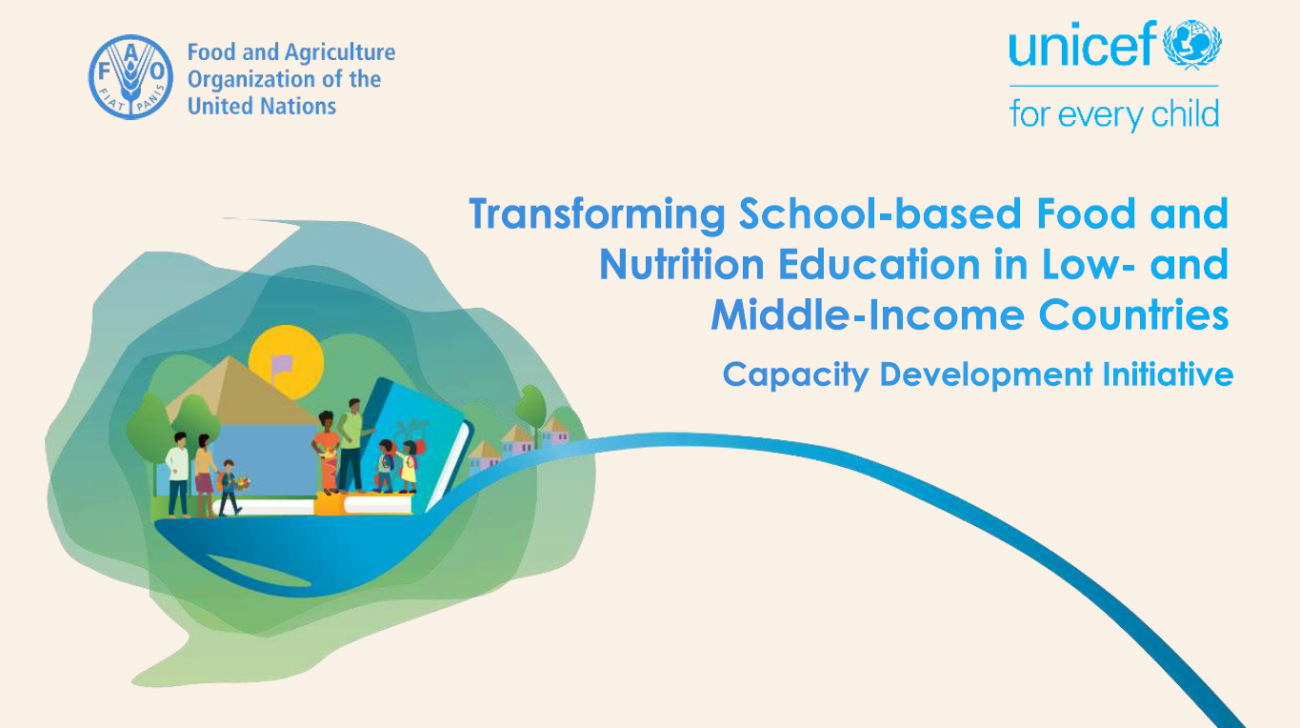
The FAO/UNICEF duo is enhancing the quality of FNE by consolidating normative guidance accrued by FAO with UNICEF’s operational presence on the ground and its renowned expertise in behaviour change communication. Furthermore, this collaboration is strengthening linkages between sectors – particularly agriculture, health and education – to ensure complementarity so that child well-being and sustainability are promoted in tandem. “Collaborating with UNICEF is really strategic not only for strengthening countries’ capacities to design and implement effective SFNE, but also to facilitate the retreat from ineffective investments in knowledge-focused approaches,” explained Fatima Hachem, Team Leader of Nutrition Education and Consumer Awareness at FAO.
Revolutionizing food and nutrition education
Context-specific, behaviour-focused FNE can complement other related interventions carried out at education sites such as school meals, school food environment policies, food loss reduction projects and micronutrient supplementation schemes. It gives children an opportunity to learn about food systems, eating practices, physical activity and personal hygiene to promote healthy habits. Teaming up is not only helping to raise awareness about the importance of FNE, but it is also helping to increase its appeal.
With this new partnership, SFNE goes beyond acquiring new knowledge and skills. It is also about living the experience. Hands-on activities enable students to directly engage with food and connect with the local context from which it is supplied. It also offers opportunities to link FNE to life skills and efforts to instill civic responsibility among today’s schoolchildren, grooming them for success as adults while preserving planetary health. Other activities foreseen by the partnership seek to improve the broader food environment in schools (e.g. regulating the promotion and sale of food and beverages) to ensure alignment with the principles being taught to support good nutrition.
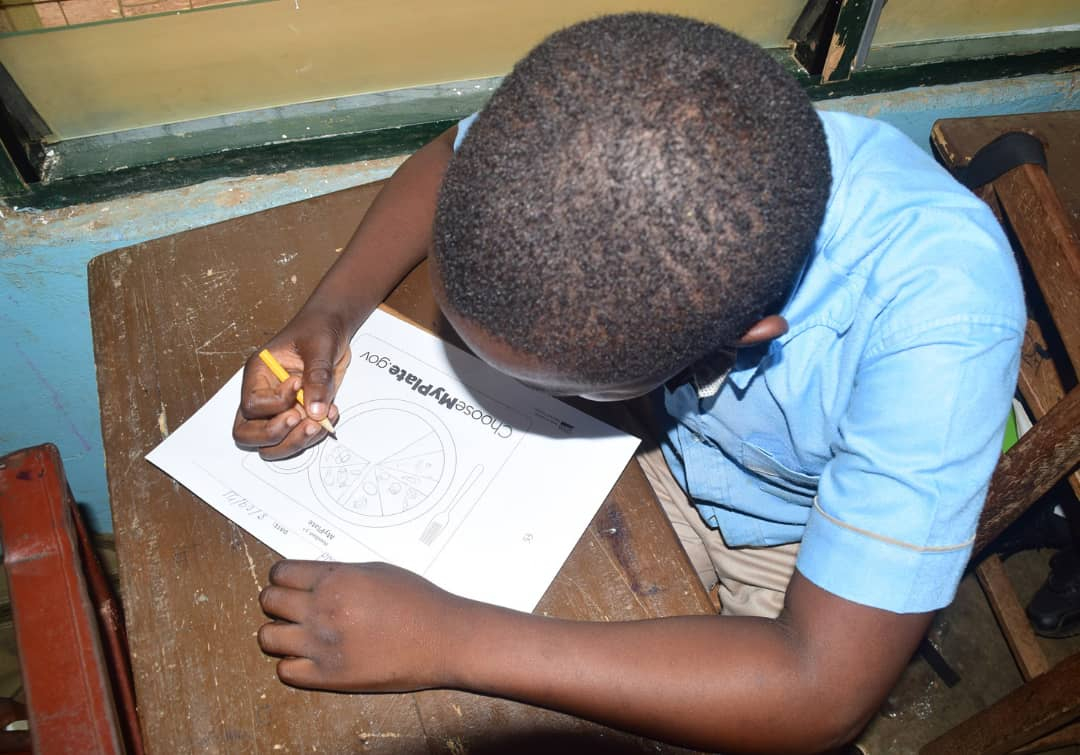
“The environment in which children grow up in influences their health outcomes. Children shouldn’t need to have to battle predatory marketing in schools,” says Pierre Cooke, a Junior Technical Advisor from the Healthy Caribbean Coalition in the Barbados, who engaged in a masterclass, held as part of this FAO/UNICEF collaboration. The masterclass (2021) attracted over 250 people, including youth advocates, and is just one aspect of the SFNE partnership. Deepika Sharma from UNICEF, explained that this was a milestone for promoting this new vision of SFNE among schoolchildren and adolescents and empowering them to play a catalytic role.
In December 2021, a virtual lab for teachers and other practitioners ensued that is further helping to bring SFNE to the next level and leverage the potential of schoolchildren to be positive influencers. Practical tips were shared to help participants apply the innovative SFNE approach, for example by engaging older students as role models and using mealtimes as food education laboratories. Jointly organized by FAO and UNICEF, both events were conducted in the context of the World Food Forum. This proved instrumental for the partnership to gain momentum during its early days and to underscore the importance of sustainable food practices as a central theme. It was also an opportunity to build on the outcomes of the 2021 UN Food Systems Summit (UNFSS).
A stepwise process at country level
The FAO/UNICEF partnership also embraces a country-led initiative that equips local actors with the knowhow and tools to design, implement and evaluate FNE in the education system, targeting curriculum developers, teacher trainers, government staff and academia, among others. It works with stakeholders through a series of workshops and core groups to generate key inputs, such as a national capacity development strategy for SFNE, that take into account the country context and priorities. Leveraging results from associated capacity assessments and national food-based dietary guidelines (FBDGs) further enables programming components to be tailored to the given setting. The process draws upon a local facilitator, who works in close collaboration with a national SFNE taskforce and relevant ministries to ensure coherence and government buy-in. Here, the emphasis has been placed on the integration or revision of SFNE into primary and secondary school curricula and enhancing its interaction with school food environments, while improving the capacity of institutions.
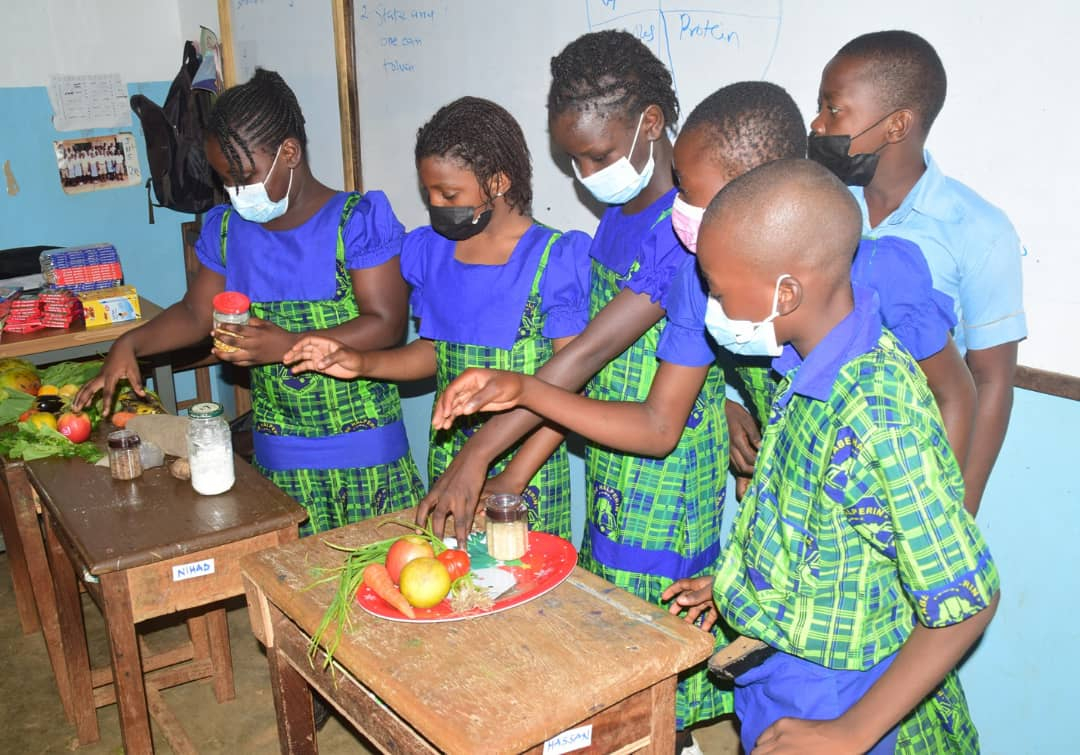
Plans for expansion
Thus far, two countries have been jointly supported to initiate this process: Ethiopia and Ghana. In Ethiopia, the collaboration culminated in the articulation of a set of FNE competencies for children to acquire along with a proposal for how it can be integrated into the curriculum, which are currently being evaluated by government education officials. Victor Mogre, Associate Professor of Nutrition Education and Training and Head of the Department of Health Professions Education and Innovative Learning at the University for Development Studies in Ghana explained that the FAO/UNICEF partnership is helping the country pivot SFNE from small-scale, one-off, research-oriented activities in limited locations to a streamlined approach with nationwide coverage. It might be an uphill effort at times given that Ghana implemented a new standard basic school curriculum as recently as 2020. Nevertheless, Victor is optimistic that the consultative process and rooting in the robust national-level capacity needs assessment will help stakeholders find solutions to overcome challenges and seize opportunities.
Guatemala has also joined the list of countries to deploy this transformative approach although discussions are still ongoing. When the UN Nutrition Secretariat spoke to colleagues in May, there was a buzz about the green light FAO and UNICEF had just received to jointly support the Ministry of Education with an SFNE capacity needs assessment. While this collaboration is still in the early stages of inception, colleagues from both UN agencies were eager to point out that they are currently negotiating a longer-term agreement and plan to expand support to other countries. The dynamism of this new approach to SFNE almost seems contagious and helps schoolchildren put the future in their hands, starting with the food on their plates.
Endnotes
[1] The paper was published in 2017 by the United Nations System Standing Committee on Nutrition (UNSCN), one of the precursors to UN Nutrition.

